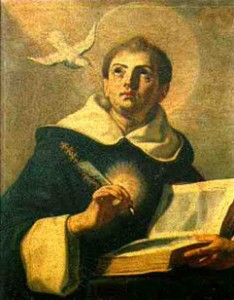Discover the life and legacy of St. Thomas Aquinas, the “Angelic Doctor” and Patron of Students. Explore his works and influence in Christianity.
Have you ever wondered who St. Thomas Aquinas was and why he is considered the “Angelic Doctor” and the Patron of Students? Let’s explore the life and legacy of this influential figure in the history of Christianity.

Early Life and Education
St. Thomas Aquinas was born in 1225 in the Kingdom of Sicily (modern-day Italy) to a noble family. He received his early education at the Benedictine monastery of Monte Cassino and later studied at the University of Naples.
Thomas was known for his exceptional intellect and dedication to learning from a young age. His thirst for knowledge and keen analytical skills would shape his future as a theologian and philosopher.
Did You Know?
St. Thomas Aquinas was often referred to as the “Dumb Ox” by his classmates due to his large build and quiet demeanor. Little did they know that this “Dumb Ox” would become one of the most influential thinkers in Western intellectual history.
The Summa Theologica
One of the most famous works of St. Thomas Aquinas is the Summa Theologica, a comprehensive summary of Christian doctrine and philosophy. This monumental work consists of over 3,000 pages and addresses a wide range of theological and philosophical topics.
The Summa Theologica is divided into three main parts: God, Man, and Christ. Each part is further subdivided into questions, articles, and objections. This systematic approach to theology and philosophy has made the Summa Theologica a cornerstone of Western thought.
Fun Fact:
St. Thomas Aquinas is said to have experienced a mystical vision while celebrating Mass, after which he stopped writing the Summa Theologica. When asked by his secretary why he had stopped, Thomas replied, “I can do no more. All that I have written seems like straw to me.”

The Five Ways
In his Summa Theologica, St. Thomas Aquinas famously presents the Five Ways, also known as the Five Proofs for the existence of God. These five arguments are based on reason and logic, aimed at demonstrating the existence of God through natural theology.
The Five Ways are:
- The Argument from Motion
- The Argument from Efficient Cause
- The Argument from Necessity and Possibility
- The Argument from Gradation
- The Argument from Design or Purpose
Each of these arguments offers a different perspective on the existence of God, inviting readers to contemplate the mysteries of creation and divine providence.
Reflect on This:
The Five Ways of St. Thomas Aquinas continue to be studied and debated by theologians, philosophers, and scholars around the world. These arguments serve as a testament to the enduring legacy of his thought.
Scholasticism and Thomism
St. Thomas Aquinas was a leading figure in the Scholastic movement, a medieval intellectual tradition that sought to reconcile faith and reason through systematic inquiry. His philosophy, known as Thomism, became a cornerstone of Scholasticism and influenced generations of scholars.
Scholasticism emphasized the use of logic, dialectics, and critical thinking in the study of theology and philosophy. St. Thomas Aquinas’s methodical approach to complex theological questions and philosophical puzzles laid the foundation for the development of Western thought.
In Your Own Words:
Scholasticism can be understood as a fusion of faith and reason, a harmonious blending of religious belief and rational inquiry. St. Thomas Aquinas’s contributions to this intellectual tradition continue to shape the way we understand the relationship between theology and philosophy.

Patron of Students
St. Thomas Aquinas is revered as the Patron Saint of Students, scholars, and universities. His dedication to learning, pursuit of truth, and commitment to intellectual inquiry have endeared him to students around the world seeking guidance and inspiration.
Students often turn to St. Thomas Aquinas for intercession in their studies, exams, and academic pursuits. His wisdom, humility, and faith serve as a beacon of light for those navigating the challenges of education and scholarship.
Personal Reflection:
Next time you find yourself struggling with a difficult assignment or feeling overwhelmed by exams, remember St. Thomas Aquinas and his unwavering commitment to learning. Let his example inspire you to persevere and strive for excellence in your academic pursuits.
Feast Day and Legacy
The feast day of St. Thomas Aquinas is celebrated on January 28th, the day of his death in 1274. This feast is an occasion for students, scholars, and believers to honor his memory, reflect on his teachings, and seek his intercession in their academic endeavors.
St. Thomas Aquinas’s legacy continues to inspire theologians, philosophers, and students of all disciplines. His contributions to the fields of theology, philosophy, and education have left an indelible mark on Western intellectual history.
Share the Inspiration:
On the feast day of St. Thomas Aquinas, take a moment to reflect on his life and legacy. Consider how his example of dedication, humility, and intellectual curiosity can guide you on your own journey of learning and discovery.

Conclusion
St. Thomas Aquinas, the Angelic Doctor and Patron of Students, remains a towering figure in the history of Christianity and Western thought. His works, such as the Summa Theologica and the Five Ways, continue to challenge and inspire readers to engage in deep philosophical inquiry and theological reflection.
As you delve deeper into the life and teachings of St. Thomas Aquinas, may you find guidance, wisdom, and inspiration to pursue truth, seek knowledge, and grow in faith. Let his example of intellectual rigor, spiritual depth, and compassionate wisdom be a guiding light on your own journey of learning and discovery. Remember, St. Thomas Aquinas is not just a historical figure but a mentor and friend in the pursuit of knowledge and understanding.
